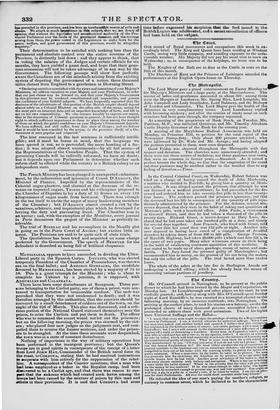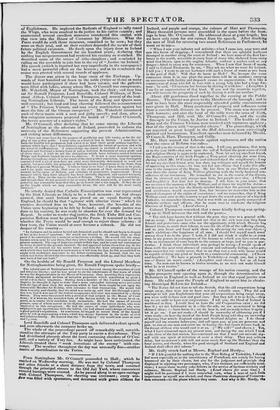fr be Country.
Mr. O'Connell arrived in Nottingham, to be present at the public dinner to which he had been invited by the Mayor and Corporation, on Monday last. At Loughborough and other places on his road, he was cordially greeted ; and, having along with Mrs. O'Connell spent Sunday night at Lord Rancliffe's, he was escorted in a triumphal chariot on the following morning, by an immense multitude, into Nottingham. On arriving at the market-place, he took his station on a balcony, amidst the prolonged cheers of many thousand persons assembled below ; and proceeded to address them with great animation. Two of his topics were Universal Suffrage and the Ballot
I assert that every man ought to enjoy the privilege of voting for a Representative to serve in Parliament. I nna a decided advocate for universal sntirage. When I sea one man born naked, and another booted and spurred. I believe that this Oistinctio has originated in the fictitious orders or society. and exists. perhaps, with a most I feeial effect ; but I never will consent to the circumstance ot ri mere difference of it lopping off a right or destroying a franchise. Every man in England is taxed; every man who is taxed and has not a vote is, in my opinion, robbe I. I am also an advocate for vote by ballot, which will tend materially to advance the interests of humanity sad the constitutional purity of election. What is more easy than for a rich robber of a Tory manufacturer to say, ' I'll turn you away if you do not vote as I please.' What can the honest Englishman do? lie most either smother the cry of conscience, or proceed manfully to the hustings and vote as conscience dictates; and then he may bo compelled to turn out of his home with his starving family, to gratify the spleen of imItry aristocrat. When a man votes by the ballot, he votes as he pleases. No mats Can persecute him for exercising the franchise as he pleases; or no one nutter that system knows how he has voted. Another great advantage of the ballot is, that it does away almost entirely with bribery and corruption. Where is the use in bribing a voter under the ballot system? Where is the security that the voter will give value for the money he has received? If he was rascal enough to take a bribe, who .knows but he will be scoundrel enough to promise one way and vote another? You might as well buy a pig in a poke as a rascal's vote, if he voted by ballot. I am also an odor cate for short Parliaments. All over the world short accounts make long friends." He ridiculed the idea of one man's paying for another's religion.. tr contrary to common sense, which he declared to be the characteristic of Englishmen. He implored the Radicals of England to rally round the Whigs, who were resolved to do justice to his native country; and enumerated several excellent measures introduced this eassitan with that view into the House of Commons by Ministers. What the Peers would do with those measures remained to be seen ; but they were on their trial, and on their conduct depended the nature of their future political existence. He dwelt upon the injury done to Ireland by the English Government for six hundred years ; &daring that nothing but misgovernment had rendered his country so wi etched. He described some of the scenes of tithe-slaughter ; and et.ncluded by calling on the assembly to join him in the cry of " Justice for Ireland.' His speech (which is reported but very imperfectly in the newspapers) had a most powerful effect on the bearers ; and at its conclusion the orator was greeted with several rounds of applause.
The dinner was given in the large room of the Exchange. Upwards of four hundred sat down to the table (twice or tlu ice as many would have participated if there had been room); and the galleries were filled with ladies, among whom Mrs. O'Connell was conspicuous. Mr. Wakefield, Mayor of Nottingham, took the chair ; and near him sat Sir Ronald Ferguson, Lord Rancliffe, Colonel Wildman, of Newstead Abbey, Colonel Peyronnet Thompson, and several of the leading Nottingham Liberals. The toasts of the King and Queen were 'well received ; but loud and long cheering followed the announcement of " The Princess Victoria, and may every machination against her meet the fate of the Orange conspiracy." Mr. Wakefield introduced each of these toasts with a neat and pithy speech ; and then, after a few eulogistic sentences proposed the health of .4. Daniel O'Connell, the heroic asserter of a nation's rights." Mr. O'Connell, after declaring that be came among the Liberals of Nottingham as the advocate of Ireland, proceeded to enforce the necessity of the Reformers supporting the present Administration, and sinking minor differences. " I have not come here for the perpose of gratifying any idle vanity, or for the dis play of any paltry pride. I come here as a kind of tact in history I come here to form the humble but permanent link which is to Isiml three great nations together— nations which have, alas! been hitherto separated from the basest of motives, and with the worst of contteqaences. I acknowledge my object is twofold—I wish to see in England and Scotland a hearty bond of union between Reformers of every grade and of every class ; I wish to see the distinctions which have hitherto existed between Whigs and Radicals buried for ever in oblivion. It is not a mere transient opinion, fleeting through my mind ; it is the result of the most perfect conviction. lain thoroughly convinced that a set of men dues not exist more thoroughly determined to work out quietly, led peacefully. the principle of Reform in every department or the State, than his Majesty's present Ministry. I believe them to be wise—I knots them to be good ; and I sin quite convinced, that even in the slowness of their movements there is security to the cause of Reform, and certainty of progressive improvement. Every measure which they have adopted has been carefully digested, And carried maturely into effect. They are the sincere friends of Reform. This is my thorough conviction ; and though they do not proceed as far as many Radicals would wish, it cannot be disputed by any reasonable man that they go an honest and a fair length. If they do not go the length which we may reasonably desire, the rest will be the more easily obtaiued."
He utterly denied that Catholic Emancipation was ever represented by the Irish Liberals as likely to be a final measure : he had always avowed, that until Ireland was placed on an equal footing with
England, he should be that "agitator with ulterior views" which his enemies described him to be. Now, however, the benefits of the Union were beginning to be felt by Ireland ; and if ample justice was done to his country, he was ready to abandon for ever the demand for Repeal. In order to render thajsustice, the Irish Tithe Bill and Corporation Reform must be granted by the Peers. It remained to be seen whether the Peers would be mad enough to reject those reforms : if they were the Union would at once become a cobweb. He did not despair of? his country " In darkness and in sorrow he had not despaired, and he should not begin to despair of her in her hour of sunshine. Ile would not deserve to sit among them as their guest if he entertained for a moment so inglorious a feeling. He would tell his mum trymen when next he saw them, that they never hail so little cause to despair as at the present moment The cap of hope was raised to their lips, and he could not contemplate its being dashed to the ground antasted. lie hail appeared before them that day in the character of counsel fur his native land; and from the kind attention and respect with which they had listened to each word as it fell from his lips, he felt assured that he might with confidence announce to his fellowcountrymen in Ireland, that the sea which had before divided the two countries was effectually dried up, and that they both new formed but one land."
On the healths of Sir Ronald Ferguson and the Liberal Members for Nottinghamshire being given, Sir Ronald Ferguson spoke briefly— The inhabitants of Nottingham had ever been foremost among the assertors of civil and religious liberty ; and he was proud to see the inhabitants of that town, of which he was the Representative in the House of Commons. thus asserting their superiority over those antiquated notions of sectarian prejudices which constituted so great a social evil in these kingdoms. Havitig been a member of the Carlow Committee of Inquiry, he thought it right to state that a more unfounded calumny never proceeded from the lips or man than the aspersion which it had been sought to east upon the honourable Member for Dublin. with reference to that transaction. He would tell them honestly and shortly, that his mind was made up, and that his thorough cunvic. tion was, that it was one of tlw neatest conspiracies that ever was concocted by a dying faetion. They were threatened with a revival of that subject in the House of Corn mons : if it were so, the wretched tools of the faction would, in that event, be so exposed, as to render their condition tmly melancholy. He had the names of several persons, some of whom moved in the highest and some in the lowest circles, who were implicand in this conspiracy. He had the names of some individuals who were employed to get lip evidence with the hellish (he had almost said)design of traducing a great patriot's reputation. In conclusion, he begged to assure them of the honest pride he telt in representing a town %hie!' was always foremost in the ranks of civil and religious liberty. Ile trusted that the "No Popery" cry would now cease at once and f ever.
Lord Rancliffe and Colonel Thompson each delivered a short speech, and soon afterwards the company broke up. The whole of the proceedings passed off remarkably well, notwithstanding the attempts of the Tory party to excite a disturbance. They had distributed placards about the town containing slanders of O'Connell, and a variety of Tory lies. As might have been anticipated, the Liberals treated these " weak inventions of the enemy" with contempt. The weather throughout the day was unusually fine—another source of mortification to the Tories.



























 Previous page
Previous page